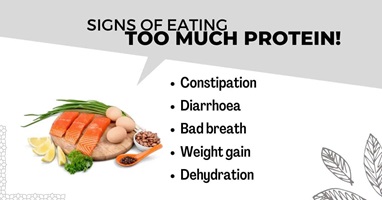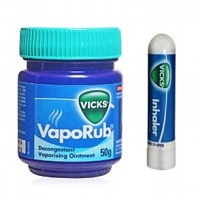Too Much Protein Signs
Too Much Protein Signs
Protein is a necessary nutrient that helps your blood deliver oxygen throughout your body, builds tissue, and regulates cell function.

Eat too much protein, though, and you risk overloading your liver and kidneys in addition to experiencing other mild side effects, including loss of appetite and poor breath.
It’s critical to understand which protein sources are superior to others to minimize health dangers.
It seems that the general diet recommendation is to “eat more protein,” because protein is the macronutrient that is most highly valued.
While all three of the major macronutrients are vital for good health and should be included in a balanced diet, protein has special physiological properties that make it essential to consume adequate amounts of it.
But is it possible to consume too much protein? Does consuming excessive amounts of protein cause weight gain?
What are the signs that you are consuming too much protein? Are there any signs of an excess of protein that one should be aware of?
Signs of Too Much Protein
Loss of bone: Diets high in protein increase the level of acid in bodily fluids, which puts more strain on the kidneys and increases the need for calcium absorption by the bones. Bone loss is the outcome.
Usually, there are no outward signs of bone loss. Bone fragility and discomfort are a couple of the symptoms.
Urinary stones: Your kidneys produce more renal acid to break down the extra protein. Kidney stones could result from the process, in addition to the other substances it produces.
As kidney stones leave your kidneys, they may hurt. They hurt in the groin, abdomen, and sides and impede the flow of urine.
Elevated chances of cancer: Diets high in protein have been associated with a higher risk of cancer.
Diet plays a major role in prostate, colon, and breast cancer prevention. It appears that faulty protein packets are the cause.
Diets that are high in red or processed meat frequently increase the risk of colorectal cancer.
Ischemic heart disease: Because high-protein diets contain higher levels of saturated fat, cholesterol, and other nutrients in a bad protein package, heart disease is more common with these diets than it is with cancer.
Each person experiences coronary heart disease symptoms differently.
Chest pain is a typical sign, but if left untreated, it can result in cardiac arrest or an attack of the heart.
You feel weak and have a headache. These over-protein symptoms can also result from the body entering a state of ketosis, according to Dr. Buchin. “When you’re on a mostly protein diet, you are ketonic,” he states.
According to UChicago Medicine, ketosis is a metabolic condition that occurs when the body uses fat as fuel instead of sugar from carbohydrates.
“You feel weak because you don’t have a lot of sugar in your body,” explains Dr. Buchin. “There is no more sugar, which makes you feel exhausted. All of your sugar reserves are gone.”
Other signs of too much protein include:
- Gaining weight
- Foul breath
- Gastrointestinal problems
- Appetite loss
- dehydration and increased urination
What is protein?
Together with lipids and carbs, protein is one of the three micronutrients.
That implies that while all other nutrients in your diet are important, protein is also important.
While each is significant, most people consume a high-protein diet because it is necessary for maintaining and growing muscle mass.
However, in the process of doing so, they often neglect other nutrients, which raises the risk of consuming too much protein, particularly in the case of a diet devoid of fat and carbohydrates.
Protein, one of the macronutrients in meals, is a substance that is present throughout your body.
Your muscles, bones, and other tissues contain protein, which your body requires to fuel essential chemical reactions.
Your body needs more than 10,000 different proteins to function.
Each protein is made up of more than twenty amino acids, nine of which your body is unable to produce on its own.
How much protein do you need?
The solution is complicated. Your age, size, sex, weight, and degree of activity all affect how many nutrients you consume.
You can also change how much protein you eat based on your health objectives.
The recommended daily intake of protein is generally 0.36 grams per pound of body weight.
Age: It is recommended that older adults consume as much as 30% of their daily calories from protein to help prevent muscle loss caused by aging.
Lifestyle: Athletes and physically active individuals require 0.5 to 0.8 grams of protein per pound per day.
Weight: Your body mass determines how much protein you require. Because men typically have more bulk than women, it is occasionally advised that they receive more.
For instance, a 130-pound adult woman who exercises for two to three hours a week and is moderately active would require 70 to 118 grams of protein a day to maintain her health.
The method corresponds to one ounce: The “1-ounce equivalent” is one unit of measurement that the United States Department of Agriculture (USDA) uses.
An ounce of meat, poultry, or fish; an egg; a quarter-cup of beans; or a half-ounce of nuts are all considered to be the equivalent of one ounce of protein.
There are several approaches to figuring out how much protein you require, and some yield varied findings.
For the best advice on your health, consult your physician.
How much protein is too much for a woman? Consuming more than 2 grams of protein per kilogram of body weight per day is considered excessive protein intake.
To prevent overestimating, your weight is modified if you are overweight before determining your protein requirements.
To create a customized plan, consult with a dietician.
Symptoms of too much protein in the blood
High blood protein levels don’t cause symptoms. You may learn you have high blood protein if a healthcare provider orders a comprehensive metabolic panel.
The results will show your total protein levels, albumin levels, and the ratio of albumin to globulins, or A/G ratio. (A normal A/G ratio is 0.8 to 2.0.)
Symptoms of too much protein in urine
What are the signs and symptoms of proteinuria?
- Swelling (edema) in your face, belly, feet, or ankles
- More frequent urination.
- Shortness of breath.
- Nausea and vomiting
- Lack of appetite.
- Muscle cramping at night.
- Puffiness around your eyes, especially in the morning
Too much protein causes skin
IgE-mediated reactions happen minutes to an hour after eating proteins and can cause skin rashes, urticaria, angioedema, wheezing, and anaphylaxis. Non-IgE-mediated reactions can take hours or days to show up.
How to remove excess protein from the body
Seven methods to get rid of extra protein in your urine:
Cease consuming protein. Low-carb, high-protein diets are common, but eating too much protein can cause blood proteins to leak into your urine.
- Eat less salt.
- Verify your insulin level.
- Consume more fiber.
- Get moving.
- Give up smoking.
- Keep some medications away.
Excessive protein intake diseases: too many protein side effects
Amyloidosis is a disorder where an excessive amount of a specific protein called amyloid builds up in the organs, impairing their normal function.
Furthermore, it causes the following diseases:
- Cancer of the breast
- Heart conditions
- Kidney illness
- Inflammation of the intestines
- Low calcium levels
- Illnesses such as Alzheimer’s, Parkinson’s, Huntington’s, Creutfl-Jakob, cystic fibrosis, and Gaucher’s disease
How to avoid eating too much protein
Getting your protein from plants and seafood, which are healthier sources, is the best way to avoid the negative effects of consuming too much of it.
To lower the amount of cholesterol and saturated fats, swap out red meat with chicken or plant-based meat alternatives.
Aim for a diet high in carbohydrates, such as fiber and unsaturated fats, and low in protein.
This will provide you with energy throughout the day. If you consume too much protein, try cutting some of it with vegetables high in fiber.
How to keep your protein intake in balance
The healthiest diet is a well-rounded, balanced diet that includes a range of vitamins and minerals, complex carbs, and healthy fats in addition to protein.
Patton offers some expert advice on proteins to assist you in finding the ideal balance:
- Disperse it: Don’t overindulge in any one meal because your body can only digest 20 to 40 grams of protein at a time.
- Make wise protein selections: When creating your weekly meal plans, avoid processed meats (sorry, hot dogs) and restrict your intake of red meat to one or two servings per week
- Add protein from plants: There are other ways to acquire enough protein outside of meat. Additionally, simple and nutrient-dense foods are nut butter, legumes, and beans.
- Select a protein powder: Out of all the tubs of protein powders at your grocery store, go for one that is organic, contains the fewest ingredients, and has undergone independent testing.
- Lastly, don’t be afraid to seek professional advice. It’s preferable to speak with a physician or a qualified dietitian for the most individualized dietary guidance.
The best sources of protein
Make sure to choose healthier options when selecting foods high in protein.
This can lessen your chance of experiencing some of the drawbacks associated with a diet heavy in protein.
Among the nutritious protein sources are:
- Pasture-raised chickens and lean meats fed on grass
- Native fish
- Pastured chickens’ eggs
- Organic and grass-fed dairy
- Beans
- Almonds
- Whole grains
Steer clear of processed or fried protein sources, as well as high-fat meats and dairy products. Instead, eat heart-healthy meats.
When to see your doctor
You should think about the potential adverse effects of a high-protein diet before deciding if it’s right for you.
Before starting any new diet, always see your doctor, particularly if you have any medical conditions.
Depending on your particular circumstances, your doctor and nutritionist can assist you in weighing the benefits and drawbacks of a high-protein diet.
In general, you must lead an active lifestyle and consume a healthy, balanced diet.
Whether you aim to grow muscle or lose weight, make sure your strategy is aligned with your health and one you can stick with in the long run.
Conclusion on Too Much Protein Signs
Consuming excessive amounts of protein—or any other nutrient—may be more detrimental to your health than beneficial.
In the long run, it could be better to consume a range of plant-based foods and consume a moderate quantity of protein each day rather than concentrating on quick fixes.
Most people don’t have to worry about obtaining too much protein, despite it being an essential ingredient for health.
However, to lower your chance of developing chronic illnesses, you should try to get your protein from healthy sources such as lean meats and whole-plant meals.
Those who have kidney issues should closely monitor their protein intake because it can have serious negative effects on their health.
FAQs about Too Much Protein Signs
What happens if you eat too much protein with low calories?
Overindulging in protein, particularly when coupled with an unbalanced carbohydrate intake, can induce ketosis, a metabolic condition in which your body begins burning fat for energy.
One of the negative effects is called “keto breath.”
What are the symptoms of too much protein?
The majority of evidence suggests that consuming more protein than 2 g per kg of body weight per day for an extended period may lead to health issues.
Indigestion and discomfort in the intestines are signs of an excess of protein.
What happens if your protein is too high?
Because many meals high in protein also include high levels of total and saturated fat, eating too much protein can raise blood lipid levels and cause heart disease.
For those who are already at risk for renal disease, consuming excess protein can be harmful to their kidneys.
How do you reduce excess protein in your body?
The diet emphasizes consuming an abundance of fruits, vegetables, and healthy fats while limiting the consumption of high-protein meals.
For those who do not have any medical illnesses, doctors typically do not advise a low-protein diet due to the possibility of nutritional shortages and other health problems.
Does protein affect the kidney?
Overindulgence in protein can lead to waste accumulation in the blood, which your kidneys might not be able to filter out completely.
However, eating too little protein can lead to other issues, so it’s critical to consume the recommended amount each day.
Your body size determines how much protein you require.
What disease does too much protein cause?
Amyloidosis is a disorder where an excessive amount of a specific protein called amyloid builds up in the organs, impairing their normal function.
Amyloidosis can have an impact on the heart, kidneys, liver, spleen, neurological system, stomach, and intestines.
Will drinking water reduce protein in the urine?
Unless you are dehydrated, drinking water won’t address the protein in your urine.
Water consumption will dilute your urine, reducing the amount of protein and other substances in it, but it won’t address the underlying reason for protein leakage from your kidneys.
What foods should I avoid if protein is high?
As part of a high-protein diet, an individual should often also stay away from the following foods:
- Things include candies, baked goods, and sodas that are made with refined sugar.
- High levels of processing.
- Foods that producers advertise as being on a “diet,” although they frequently have high sugar content.
Can too much protein make you gain weight?
As foods high in protein make you feel fuller than those high in fat and carbohydrates, protein is quite beneficial for weight loss.
But like anything else, moderation is key. Eating too much protein can still lead to weight gain.
How long does it take for your protein levels to go down?
Amino acids, which are produced when your body breaks down protein, remain in your bloodstream until they are absorbed.
These amino acid levels in the blood remain high for around 4-5 hours after a person consumes casein (while whey elevates these levels in the blood for approximately 90 minutes.
How can I protect my kidneys from a high-protein diet?
Five dietary ways to help protect your kidneys:
A balanced diet should include plenty of protein, but consuming too much protein might make it difficult for your kidneys to filter waste from your blood and could lead to:
- Increased fiber.
- Not all carbs are created equal.
- Limit your fat.
- Consider alcohol carefully.
Can too much protein damage your liver?
Proteins and carbs can be transformed into triglycerides if consumed in excess.
These can end up in the liver after being accumulated in fat cells.
Insulin resistance has the potential to raise triglycerides and enhance the liver’s absorption of fatty acids, which can further build up triglycerides in the liver.
What are the two diseases caused by protein?
Prolonged protein shortage can cause major health problems in humans.
These disorders include, for instance, Kwashiorkor and Marasmus.
What vitamin reduces protein in urine?
Correction of vitamin D insufficiency may reduce proteinuria in diabetic individuals with nephropathy since vitamin D deficiency may worsen proteinuria and DN.
How much protein in urine is normal?
Blood protein seeps into the urine if the glomeruli are injured.
Less than 150 milligrams, or roughly 3% of a teaspoon, of protein should normally be found in pee each day.
Proteinuria is defined as more than 150 mg per day.
What happens when you eat protein without working out?
Inefficient protein utilization by the body can also result in low energy, stop muscle growth, and make you feel a little queasy just thinking about it.
v ~ What happens if you eat only protein for a week?
Lubeck adds, “It’s also important to emphasize that eating mostly or exclusively protein is not good for your kidneys.”
Your body finds it more difficult to break down and filter protein, so your kidneys have to work considerably harder to complete their job.
Kidney injury might result from an excessive protein intake.
Too Much Protein Signs: Can too much protein cause belly fat?
Yes, too much of anything can lead to obesity. The lengthy response is a little trickier to understand.
Generally speaking, a person’s entire diet—including the quantity of fats and carbs they consume—should be taken into account when analyzing weight gains related to protein consumption.
Too Much Protein Signs: How do you check the protein in your body?
Using a tiny needle, a medical practitioner will draw blood from a vein in your arm.
A tiny amount of blood will be collected into a test tube or vial following the insertion of the needle.
The needle may sting a little as it enters or exits your body. Usually, this takes under five minutes.


